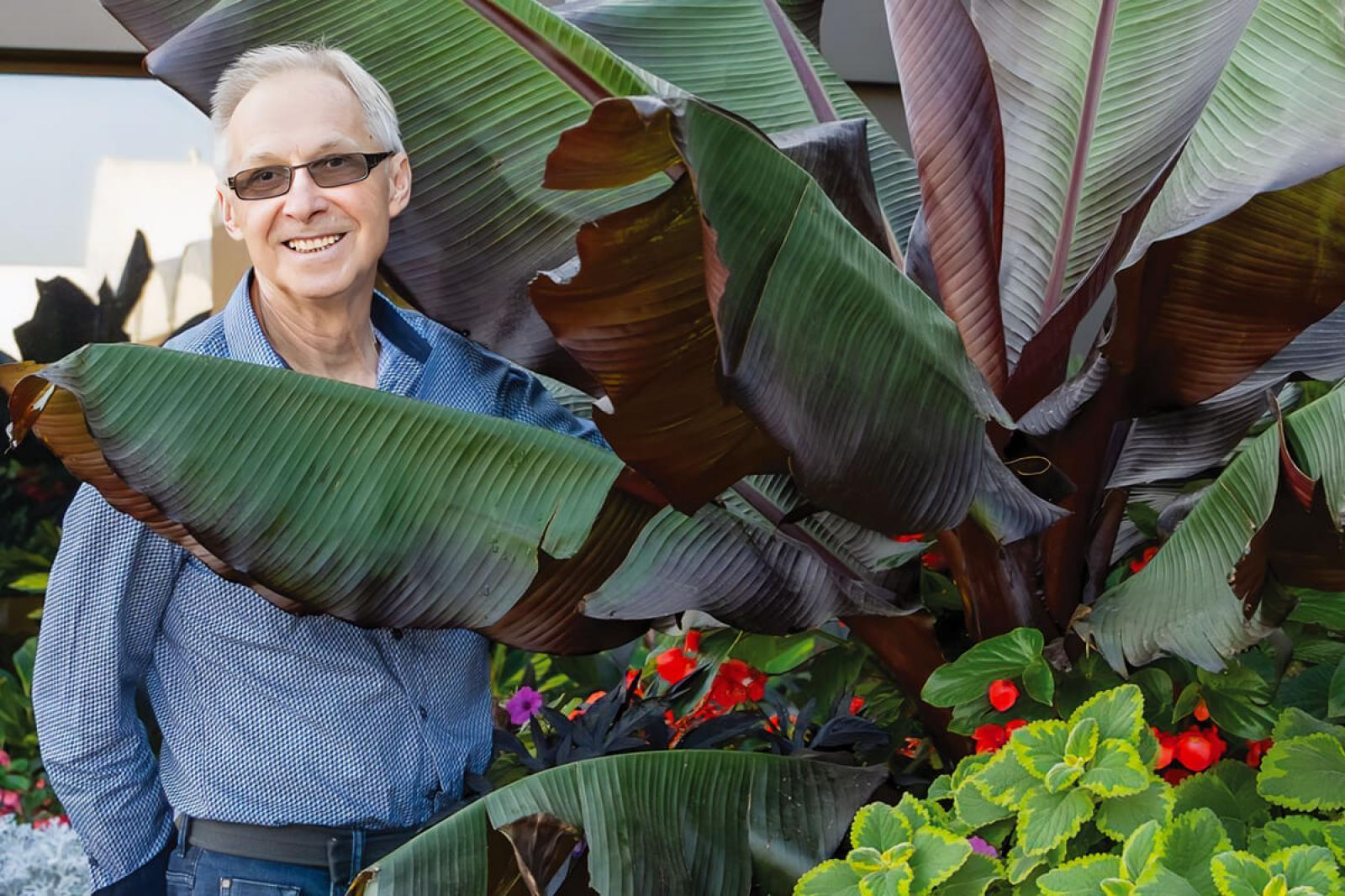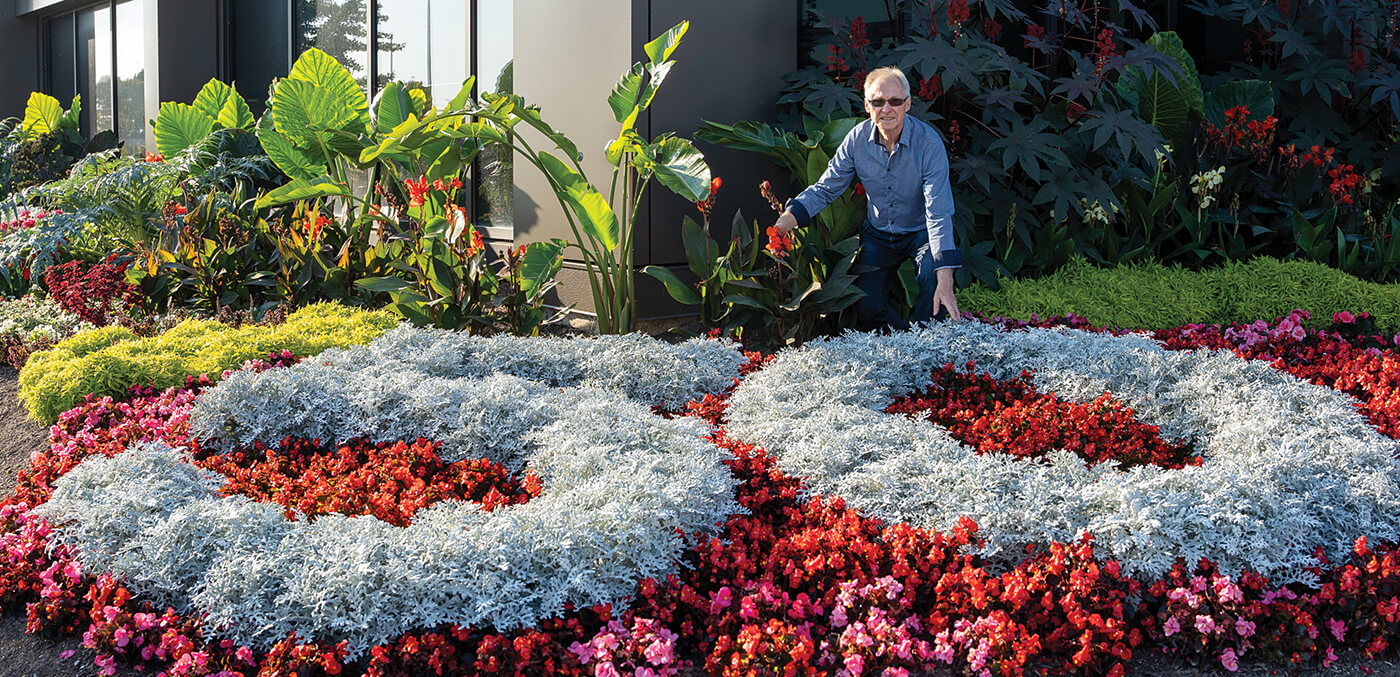March 15, 2024

Stanley Roszak's methodical, patient work ethic produces amazing results.
Lessons from a lifelong horticulturist
By Julia Harmsworth
Stanley Roszak is the picture of patience. When it comes to designing, planting, weeding and everything in between, he says, “If I start, I finish.”
Roszak was born on a nursery farm in Poland, the youngest in a family of five. He spent 17 years studying horticulture: five years of technical school, five years for his Bachelor’s degree, two years for his Master’s, and five years for his PhD in seed production.
His love of plants took him from Poland to work in Germany, Czechia, Hungary, the Netherlands — where he worked at the Keukenhof, a highlight of his career — and finally to Canada in the late 1980s. “From everywhere I learned something,” he said of his travels.
Roszak worked at Edwards Gardens and Centennial Park Conservatory in Toronto and created horticultural designs for Canada Blooms. In retirement, he works two days a week at the Landscape Ontario office in Milton, Ont., designing and maintaining the grounds and the planters that appear throughout the summer.
“Whatever you see outside is typical European [style] from the 1960s and 70s,” he said, referring to the grounds. “You see the sound of music. That’s my design.”
On the musical note, Roszak believes a well-designed garden is like a symphony orchestra. He doesn’t have a favourite part of the LO grounds because he sees it as a comprehensive composition, not individual parts.
To complete a composition, he uses four design elements — colour, texture, form and space — and five design principles: balance, rhythm, proportion, dominance and harmony. Together, these elements and principles create an artistic whole.
 Roszak's efforts went a long way to beautify the grounds of the Landscape Ontario site in Milton, Ont., for the association's 50th anniversary celebration in August 2023.
Roszak's efforts went a long way to beautify the grounds of the Landscape Ontario site in Milton, Ont., for the association's 50th anniversary celebration in August 2023.
This keen focus and attention to detail sets Roszak’s designs apart. “In my opinion, the plant has a face, has a front, and you have to turn it that way, this way,” he said.
One of his favourite designs is the sculpture he created for the 2003 Mosaïcultures Internationales in Montréal, an international mosaiculture competition. Chosen to represent the City of Toronto, he and his group constructed a creature with the body of a buffalo — representing Canada’s Indigenous peoples — and three heads representing the populations that have found home in Toronto: the lion for Africa, the deer for Europe and the tiger for Asia.
Roszak loves watching other people walk through gardens and viewing his designs, like the mosaiculture: “I like to always stay behind, and if I see a smile, that’s the payback.”
He also created striking displays for chrysanthemum shows during his work as a grower and designer for the City of Toronto. One basket contained over 5,000 chrysanthemums, which demanded a minimum two hours of work every other day to maintain.
This methodical, patient work ethic is key to Roszak’s results. He believes creating any flower bed or garden is one per cent inspiration and 99 per cent perspiration.
“I never cheat the plants. You have to give them everything. You have to do what the plant at that moment needs. If the plant needs water, they have to be watered. I feel pain if I break the leaf.
I know the plant’s feeling the same way, so I must be gentle,” he said. “My respect to the plants is 100 per cent. All my life, I know only plants. So that’s my way.”
In addition to his dedication to plants, Roszak is known for his dedication to his community. He taught courses on plant propagation in Toronto, teaching elementary and secondary students how to grow plants in eggshells.
He was recognized with an Etobicoke Urban Hero Award in 2014 for making the community a better place to live, work and play. He gave over 10,000 volunteer hours to help students at Bishop Marrocco/Thomas Merton Catholic Secondary School build and tend gardens.
Today, he does horticulture work for small non-profits and organizations, including his church. He often works on funeral arrangements, which he believes should be more colourful.
In his free time, Roszak collects unusual seeds and plants — some of which he brings to the LO office, like a succulent called Euphorbia lactea, or “dragon bones.” He rents greenhouse space in Toronto to hold them all. He joked, “If you’re addicted [to plants] like me, that’s not good. It’s expensive. I don’t smoke, I don’t drink, so I spend my money on plants.”
This monumental love of plants is Roszak’s motivation. “Why do I like plants so much?” he pondered. “Plants give me pleasure all the time. They never give me a cold shoulder; they never back stab me. And they pay you back.”
“I started with plants, and I think to my last day I’ll be with plants. I cannot doubt them because they are part of my life.”
Stanley Roszak is the picture of patience. When it comes to designing, planting, weeding and everything in between, he says, “If I start, I finish.”
Roszak was born on a nursery farm in Poland, the youngest in a family of five. He spent 17 years studying horticulture: five years of technical school, five years for his Bachelor’s degree, two years for his Master’s, and five years for his PhD in seed production.
His love of plants took him from Poland to work in Germany, Czechia, Hungary, the Netherlands — where he worked at the Keukenhof, a highlight of his career — and finally to Canada in the late 1980s. “From everywhere I learned something,” he said of his travels.
Roszak worked at Edwards Gardens and Centennial Park Conservatory in Toronto and created horticultural designs for Canada Blooms. In retirement, he works two days a week at the Landscape Ontario office in Milton, Ont., designing and maintaining the grounds and the planters that appear throughout the summer.
“Whatever you see outside is typical European [style] from the 1960s and 70s,” he said, referring to the grounds. “You see the sound of music. That’s my design.”
On the musical note, Roszak believes a well-designed garden is like a symphony orchestra. He doesn’t have a favourite part of the LO grounds because he sees it as a comprehensive composition, not individual parts.
To complete a composition, he uses four design elements — colour, texture, form and space — and five design principles: balance, rhythm, proportion, dominance and harmony. Together, these elements and principles create an artistic whole.
 Roszak's efforts went a long way to beautify the grounds of the Landscape Ontario site in Milton, Ont., for the association's 50th anniversary celebration in August 2023.
Roszak's efforts went a long way to beautify the grounds of the Landscape Ontario site in Milton, Ont., for the association's 50th anniversary celebration in August 2023.
This keen focus and attention to detail sets Roszak’s designs apart. “In my opinion, the plant has a face, has a front, and you have to turn it that way, this way,” he said.
One of his favourite designs is the sculpture he created for the 2003 Mosaïcultures Internationales in Montréal, an international mosaiculture competition. Chosen to represent the City of Toronto, he and his group constructed a creature with the body of a buffalo — representing Canada’s Indigenous peoples — and three heads representing the populations that have found home in Toronto: the lion for Africa, the deer for Europe and the tiger for Asia.
Roszak loves watching other people walk through gardens and viewing his designs, like the mosaiculture: “I like to always stay behind, and if I see a smile, that’s the payback.”
He also created striking displays for chrysanthemum shows during his work as a grower and designer for the City of Toronto. One basket contained over 5,000 chrysanthemums, which demanded a minimum two hours of work every other day to maintain.
This methodical, patient work ethic is key to Roszak’s results. He believes creating any flower bed or garden is one per cent inspiration and 99 per cent perspiration.
“I never cheat the plants. You have to give them everything. You have to do what the plant at that moment needs. If the plant needs water, they have to be watered. I feel pain if I break the leaf.
I know the plant’s feeling the same way, so I must be gentle,” he said. “My respect to the plants is 100 per cent. All my life, I know only plants. So that’s my way.”
In addition to his dedication to plants, Roszak is known for his dedication to his community. He taught courses on plant propagation in Toronto, teaching elementary and secondary students how to grow plants in eggshells.
He was recognized with an Etobicoke Urban Hero Award in 2014 for making the community a better place to live, work and play. He gave over 10,000 volunteer hours to help students at Bishop Marrocco/Thomas Merton Catholic Secondary School build and tend gardens.
Today, he does horticulture work for small non-profits and organizations, including his church. He often works on funeral arrangements, which he believes should be more colourful.
In his free time, Roszak collects unusual seeds and plants — some of which he brings to the LO office, like a succulent called Euphorbia lactea, or “dragon bones.” He rents greenhouse space in Toronto to hold them all. He joked, “If you’re addicted [to plants] like me, that’s not good. It’s expensive. I don’t smoke, I don’t drink, so I spend my money on plants.”
This monumental love of plants is Roszak’s motivation. “Why do I like plants so much?” he pondered. “Plants give me pleasure all the time. They never give me a cold shoulder; they never back stab me. And they pay you back.”
“I started with plants, and I think to my last day I’ll be with plants. I cannot doubt them because they are part of my life.”